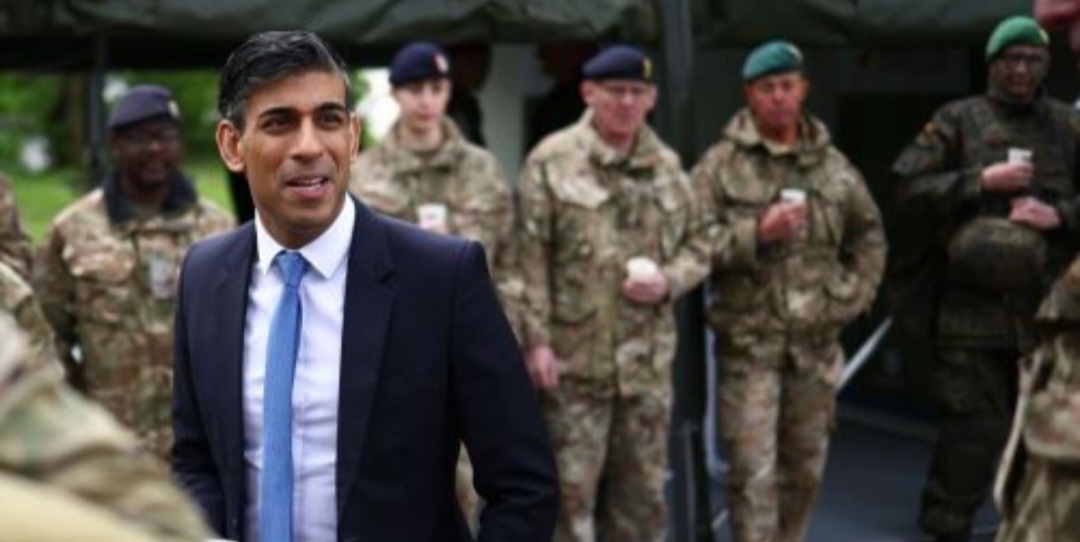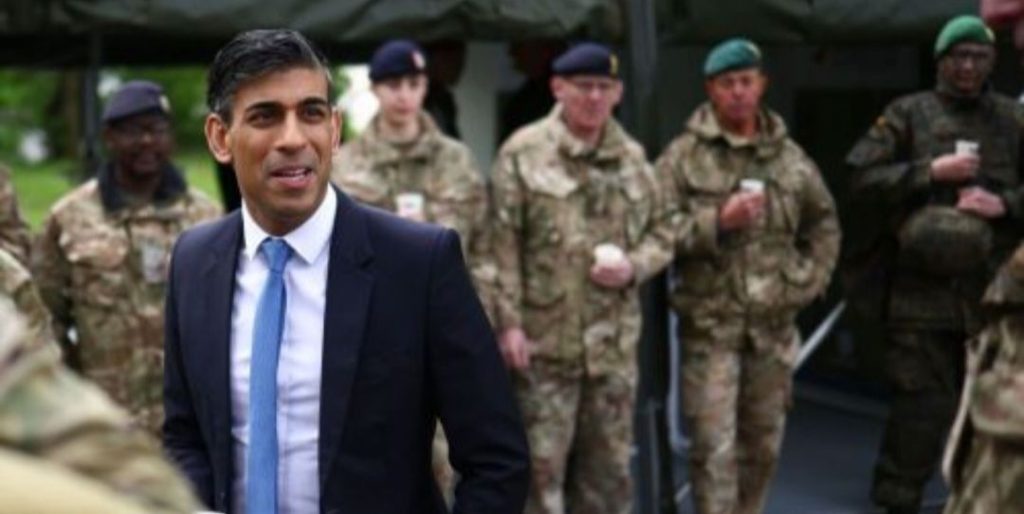
All 18-year-olds will have to take part in some kind of civic duty by enrolling for 12 months in the armed forces.
Or they could instead opt to join the police, fire service or another body that does work in the community for one weekend every month.
The Prime Minister announced his eye-catching proposal as he drew up the finishing touches to his general election manifesto.
He believes it would unite the nation, combat crime and give youngsters life-changing skills

And he said the Scandinavian-style programme would begin by September next year if he is returned to No10 on July 4.
Mr Sunak told the Sunday Express it would “create a shared sense of purpose among our young people and a renewed sense of pride in our country”.
National Service – abolished 64 years ago – has only been in place in the UK twice in the modern era, once during the First World War, and again from 1939.
Under the 21st-century version, youngsters would be able to compete for a 12-month, full-time military commission with the armed forces or with UK cyber defence.
There would be 30,000 places for the country’s “brightest and best”.
Others would have to volunteer for one weekend per month for “civil resilience” – activities ranging from supporting flood defences and helping during natural disasters to collecting and delivering essential items for the NHS.
It is hoped that as well as the police and fire service, young people would work with search and rescue teams and other voluntary organisations.
A Royal Commission would decide how the National Service Programme will be rolled out.
Mr Sunak said last night: “This is a great country but generations of young people have not had the opportunities or experience they deserve and there are forces trying to divide our society in this increasingly uncertain world.
“I have a clear plan to address this and secure our future. I will bring in a new version of National Service to create a shared sense of purpose among young people and a renewed sense of pride in our country.
“This will provide life-changing opportunities for our young people, offering them the chance to learn real-world skills, do new things and contribute to their community and our country.”
Conservatives hope the initiative will provide “valuable work experience” and “ignite a passion for a future career in healthcare, public service, charity or the Armed Forces”.
Those joining the military programme would work in logistics, cyber security, procurement or civil response operations and receive a £10,000 stipend. Those participating in the 25-days-a-year civilian programme would do so on a volunteer basis with the Government contributing towards training costs
Penny Mordaunt, a former Defence Secretary, said: “You sometimes hear young people today dismissed as ‘snowflakes’. Not in my experience they’re not.
“They have huge potential and care deeply about their communities and the world around them. Whenever we give them opportunity they show us they want to do their duty.
“Every 18-year-old should have greater opportunity to develop their character, capabilities and the attitudes that will allow them and the nation to succeed, regardless of their background and where they live.”
General Lord David Richards, head of the Armed Forces between 2010 and 2013, said: “I think overall this is an excellent idea. Both dimensions, military and civil, would instil in our well-meaning but often confused younger generation the sense of national purpose and cohesion – of belonging to something bigger than themselves.
“But I would need to see more details about how the Armed Forces would have sufficient resources to recruit and train numbers that might be drawn to this option, while keeping their own high standards.”
Gen Sir Richard Barrons, former head of Joint Forces Command, added: “If this was properly constructed and the numbers contained, we might get some value from the military option.
“My real concern is that there is absolutely no capacity to absorb anything other than a handful of people at the minute.
“It would need real funding… from outside the Armed Forces.”
More than two million men were conscripted into the Army, Royal Navy or Royal Air Force under the original National Service programme from 1949 to 1963.
This time, it is planned that the programme will also recruit volunteers to work with charities that tackle loneliness and support older, isolated people.
The Royal Commission – the first of the century – would work with experts from the Armed Forces and across society to design the programme.
A National Service Act would require every 18-year-old to take part in the programme by the end of the next Parliament.
It is expected to cost £2.5billion a year by 2029-30, with £1billion raised through a crackdown on tax avoidance and evasion. The remaining £1.5billion would come from cash used for the UK Shared Prosperity Fund, which replaced EU structural funds.
Tories say that while bringing back National Service would be a “major change in the way our country works” it is “completely essential”.
A source said: “Only by nurturing our shared culture and fostering a sense of duty can we preserve our nation and our values for decades to come.”
Denmark this year announced military conscription would include women for the first time. And in Sweden, young people compete to take part in military service and participants in a civil defence programme help emergency services and protect the national grid.
The move comes as Sir Keir Starmer confirmed a Labour government would give 16 and 17-year-olds the vote.
He said: “If you can work, if you can pay tax, if you can serve in your Armed Forces, then you ought to be able to vote.”




